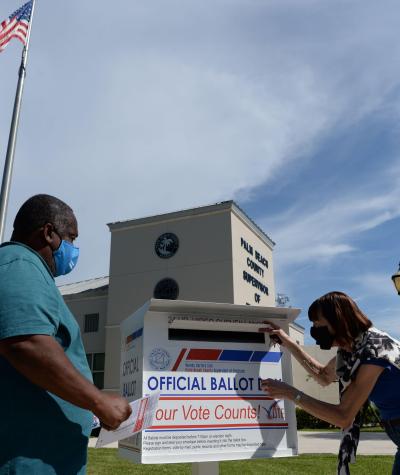Our democracy works best when every voter can participate. Voting by mail and voting early are processes that help voters do that.
Voting by mail accommodates voters who have disabilities, lack easy access to transportation or are away from home on Election Day; early voting periods prevent lines and crowded polling places and allow voters whose schedules or responsibilities would not allow them to get to the polls on Election Day to vote in person.
Campaign Legal Center (CLC) released its second report grading states on their early voting and vote-by-mail laws on Sept. 21, 2022. The first report, released on Aug. 11, 2021, did not include scores for states whose legislatures had not adjourned at that time or were scheduled to return later in the year to consider voting rights legislation.
This report provides grades for all 50 states on their vote-by-mail and early voting laws as of Aug. 1, 2022 and notes specific changes made during the 2022 legislative sessions.
This report once again uses a 10-point scale to grade the performance of each state. But a few changes have been made to grading criteria to reflect that just because a state doesn’t explicitly prohibit something that would make voting more accessible, like ballot drop boxes, doesn’t mean the state is actually providing it.
For example, Delaware may not explicitly ban drop boxes — but it also doesn’t require them, and it only allows them to be located inside of election offices, making them inaccessible outside of business hours. The state does not get a point for this.
In addition to grading the states on their vote-by-mail and early voting policies, this report also highlights how states within the same region compare to one another:
- Northeastern states — Rhode Island, New Jersey and Massachusetts rank among the highest on our scorecard in the country and in the region, while New Hampshire and Connecticut have the fewest opportunities for voting by mail and voting early in the region.
- Southern states — Seven out of the 10 states with the highest Black populations are located in the South and, with the exception of Virginia, all earned “restrictive” and “most restrictive” scores. While most states in the region provide only superficial access to early voting and vote by mail, Mississippi and Alabama had the very lowest scores. Alabama remains the worst state in the country with a two out of 10 score and no meaningful changes over the past year.
- Western states — Washington leads the way, once again receiving a score of 10 out of 10 (one of only two states to do so). Other states like California, Colorado, Nevada and Montana come close with scores of nine out of 10. On the other hand, Wyoming and South Dakota have some of the more restrictive vote-by-mail laws in the West.
- Midwestern states — The Midwest holds both an example for the rest of the nation and a cautionary tale. Like last year, Illinois is one of two states to score a 10 out of 10 on our voter scorecard. In contrast, Missouri’s score of four out of 10 remains unchanged.
Finally, this report highlights the disparities faced by voters of color and voters with disabilities in accessing vote-by-mail and early voting, irrespective of the individual scores of the states.
Even in states where the scores appear accessible — such as Arizona or Montana — voters of color and voters with disabilities suffer from nuanced applications of vote-by-mail and voting policies that cause disproportionate ballot rejections and lack of access.
As we stated last year, a state’s score should be assessed critically and not at face value for this reason.
The expansion of vote-by-mail and early voting opportunities were key to the 2020 election having the biggest turnout in a century. States should be working to expand these opportunities so that voter turnout can continue to improve.
Our elections should be safe and accessible, which means ensuring every voter can make their voice heard without barriers.

